Submitted:
19 May 2023
Posted:
22 May 2023
You are already at the latest version
Abstract
Keywords:
1. Introduction
1.1. Genetically modified crops
1.2. Antibiotics in livestock production
2. Materials and Methods
- i.
- How can innovative technologies help secure ample food supply?
- ii.
- How can the interests of producers, including smallholder farmers and consumers, be adequately represented within food security policy and planning?
- iii.
- What role can and should non-governmental actors play in setting out food policies?
- iv.
- What factors affect food (in)security and how do they relate to each other?
- v.
- Who should be responsible for ensuring food innovations and technologies are safely and responsibly implemented?
- vi.
- What platforms for collaboration can help ensure the safe and responsible implementation of food innovations?
2.1. Methodology for quantitative data collection
2.2. Methodology for qualitative data collection
2.2.1. In-depth Interviews
2.3. Data analysis
2.4. Ethical consideration
3. Results
3.1. Knowledge, attitudes and practices on GM foods
3.2. Main uses of GM foods
3.3. GMO Innovations and Food Safety
3.4. GMOs and Environmental Safety
| GMO and Environmental Safety | Frequency and Percent (%) | ||||
|---|---|---|---|---|---|
| Classification statements | Worse | Neither better nor worse | Better | Not sure | No Answer |
| Increased herbicide uses | 4 (14%) | 7 (25%) | 8 (29%) | 6 (21%) | 3 (11%) |
| Development of Herbicide-ResistantWeeds “super weeds” | 7 (25%) | 7 (25%) | 4 (14%) | 7 (25%) | 3 (11%) |
| Development of Insect-Resistant Crops “Super bugs” | 6 (21%) | 6 (21%) | 6 (21%) | 7 (25%) | 3 (11%) |
| Contamination due to gene flow from GM crops to wild and weedy crop relatives, non-GM crops and foods | 10 (36%) | 6 (21%) | 2 (7%) | 7 (25%) | 3 (11%) |
| Biodiversity loss | 9 (32%) | 7 (25%) | 3 (11%) | 6 (21%) | 3 (11%) |
3.5. Ethics and GMO innovations
| Ethics and GMO | Frequency and percent (%) | ||||
|---|---|---|---|---|---|
| Classification statements | Worse | Neither better nor worse | Better | Not sure | No Answer |
| Potential harm to human health | 8 (29%) | 9 (32%) | 3 (11%) | 3 (11%) | 5 (18%) |
| Potential harm to environment | 10 (36%) | 7 (25%) | 3 (11%) | 4 (14%) | 4 (14%) |
| Negative impact on traditional farming practices | 10 (36%) | 6 (21%) | 3 (11%) | 4 (14%) | 5 (18%) |
| Excessive Corporate dominance | 11 (39%) | 7 (25%) | 1 (4%) | 4 (14%) | 5 (18%) |
| “Unnaturalness” of technology | 7 (25%) | 9 (32%) | 2 (7%) | 5 (18%) | 5 (18%) |
3.6. Ethical issues that limit adoption and use of GMO technologies
3.7. Food security and GMOs innovations
| Perceptions on GMOs | Respondents feedback (YES vs No) | Frequency (N) |
Percent (%) |
|---|---|---|---|
| Are GMOs safe? | Yes | 18 | 64 |
| No | 10 | 36 | |
| Are GMOs perceived differently from traditional foods? | Yes | 26 | 93 |
| No | 2 | 7 | |
| Are there known main issues of concern for human health? | Yes | 16 | 57 |
| No | 12 | 43 | |
| Are there implications for farmers if they turn to GMOs crop production? | Yes | 24 | 86 |
| No | 4 | 14 |
3.7.1. Perceptions and positive effects of GM foods in crop production
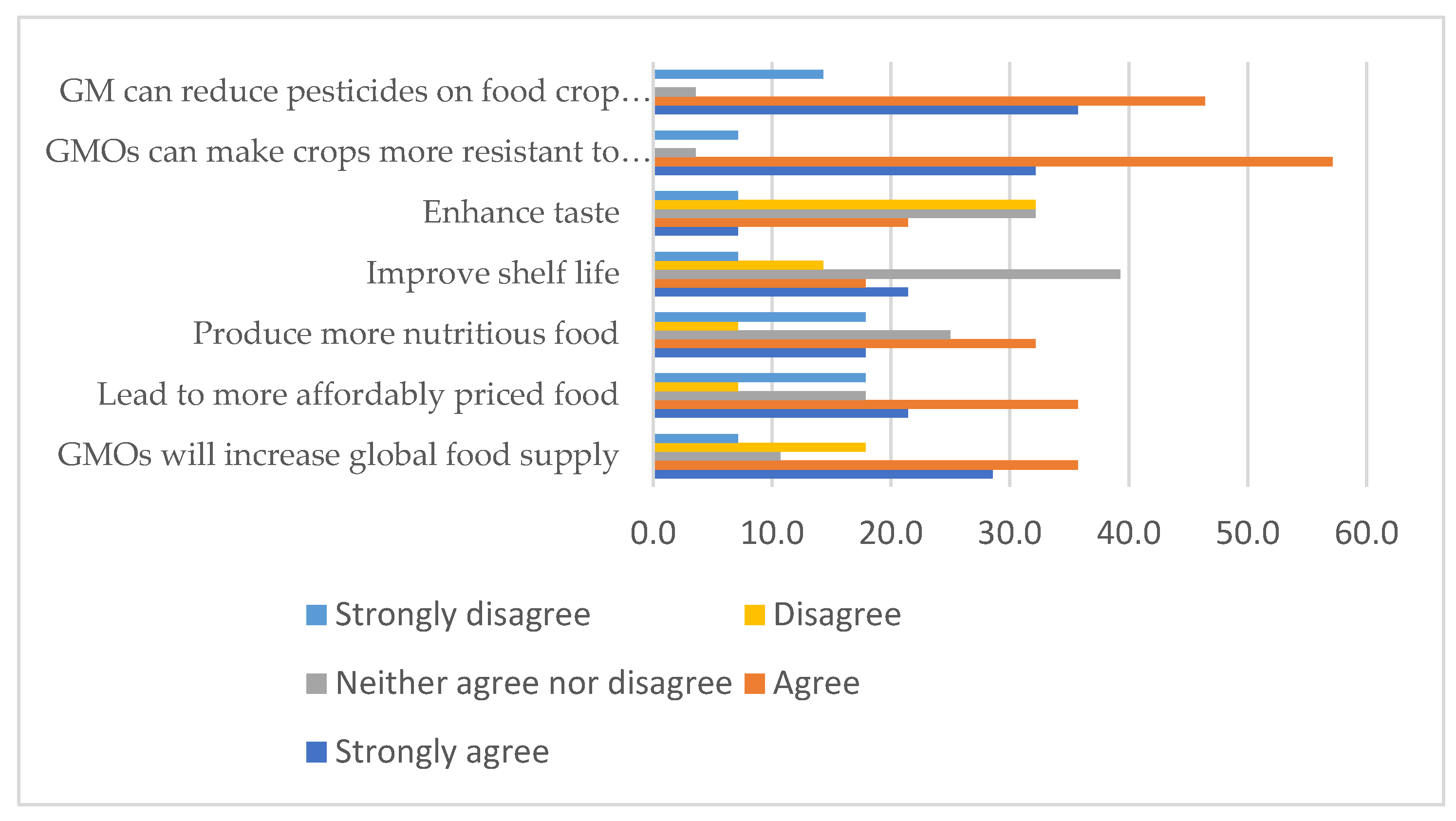

3.8. Policy, legal and regulatory framework on GMOs
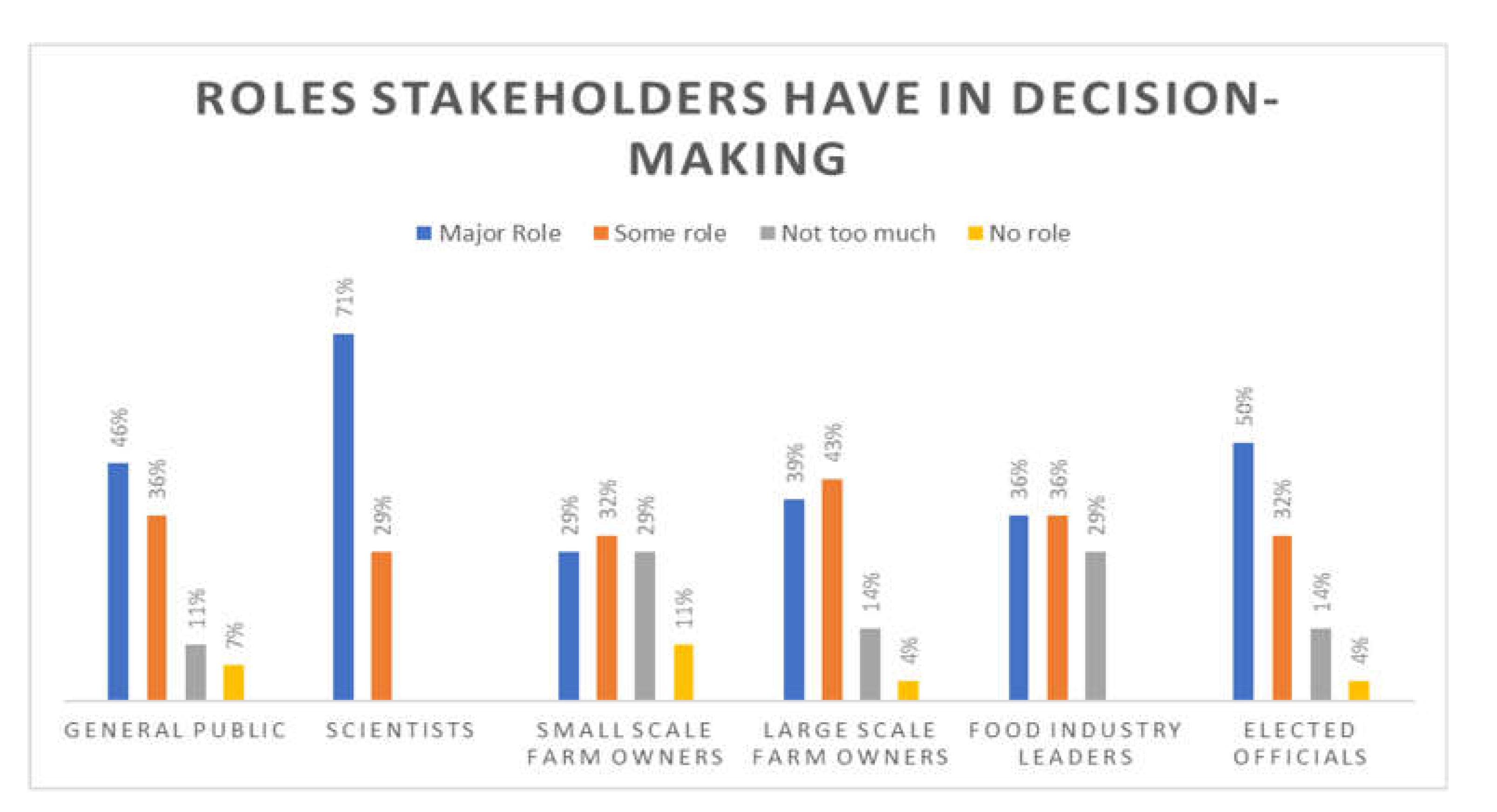
4. Governance of Antimicrobial Resistance Food Innovation.
4.1. Awareness of AMR and sources of information about AMR food information.
4.2. Knowledge, attitudes and practices concerning AMR
| Variables | Correct Percent (%) |
Incorrect Percent (%) |
|---|---|---|
| Antibiotic resistance occurs when your body becomes resistant to antibiotics and they no longer work as well | 52 | 48 |
| Many infections are becoming increasingly resistant to treatment by antibiotics | 93 | 7 |
| If bacteria are resistant to antibiotics, it can be very difficult or impossible to treat the infections they cause | 100 | 0 |
| Antibiotic resistance is an issue that could affect me or my family | 100 | 0 |
| Antibiotic resistance is an issue in other countries but not here | 96 | 4 |
| Antibiotic resistance is only a problem for people who take antibiotics regularly | 93 | 7 |
| Bacteria which are resistant to antibiotics can be spread from person to person | 96 | 4 |
| Antibiotic-resistant infections could make medical procedures like surgery, organ transplants and cancer treatment much more dangerous | 100 | 0 |
| Antibiotic-resistant bacteria can spread from animals to animal products people eat, such as chicken and meat | 93 | 7 |
| Antibiotic-resistant bacteria can spread from animals to crop produce, such as fruits and vegetables, through unclean water or soil | 89 | 11 |
| Antibiotic-resistant bacteria can spread from animals to the environment, through animal faeces. | 96 | 4 |
| You can become sick with bacterial infections that are resistant to antibiotics if eat food that's been infected with antibiotic-resistant bacteria and not properly prepared or cooked. | 93 | 7 |
| You can become sick with bacterial infections that are resistant to antibiotics if handle unclean animals and don't wash your hands. | 93 | 7 |
| You can become sick with bacterial infections that are resistant to antibiotics if touch or use unclean surfaces and don't wash your hands or clean surfaces. | 85 | 15 |
| Antibiotics widely used in the country for food production. | 96 | 4 |
| Variables | Range | Mean | SD | Min | Max |
|---|---|---|---|---|---|
| Knowledge | |||||
| Knowledge scores | 0-15 | 13.74 | 1.35 | 10 | 15 |
| Attitudes | |||||
| Perceived risk to farmers | 1-5 | 1.85 | 1.06 | 1 | 5 |
| Perceived risk of misuse | |||||
| Use of antibiotics to prevent diseases | 1-5 | 3.89 | 1.34 | 1 | 5 |
| Use of antibiotics to enhance growth | 1-5 | 3.37 | 1.47 | 1 | 5 |
| Use of antibiotics as therapy | 1-5 | 3.33 | 1.41 | 1 | 5 |
| Use of antibiotics in food to treat clinical diseases | 1-5 | 3.15 | 1.20 | 1 | 5 |
| Practices | |||||
| People should use antibiotics only when they are prescribed by a vet doctor | 1-3 | 1.30 | 0.72 | 1 | 3 |
| Farmers should give fewer antibiotics to food-producing animals | 1-3 | 1.37 | 0.79 | 1 | 3 |
| People should not keep antibiotics and use them later for other livestock diseases | 1-3 | 1.11 | 0.42 | 1 | 3 |
| Governments should reward the development of new antibiotics | 1-3 | 1.56 | 0.80 | 1 | 3 |
| Pharmaceutical companies should develop new antibiotics | 1-3 | 1.52 | 0.85 | 1 | 3 |
| Antibiotic resistance is one of the biggest problems the world faces | 1-3 | 1.07 | 0.27 | 1 | 2 |
| Medical experts will solve the problem of antibiotic resistance before it becomes too serious | 1-3 | 2.33 | 0.68 | 1 | 3 |
| Everyone needs to take responsibility for using antibiotics responsibly | 1-3 | 1.00 | 0.00 | 1 | 1 |
| There is not much people like me can do to stop antibiotic resistance | 1-3 | 2.96 | 0.19 | 2 | 3 |
| I am worried about the impact that antibiotic resistance will have on my health, and that of my family | 1-3 | 1.00 | 0.00 | 1 | 1 |
| I am not at risk of getting an antibiotic resistant infection, as long as I take my antibiotics correctly. | 1-3 | 2.74 | 0.66 | 1 | 3 |
4.3. Governance of Antibiotic resistance risks
| Statement raising awareness on AMR risks | Frequency | Percent (%) |
|---|---|---|
| 1. Statement raising AMR risks in human health | ||
| No significant awareness-raising activities on antibiotic resistance | 3 | 11.11 |
| Some activities in parts of the country to raise awareness about risks of antibiotic resistance and actions that can be taken to address it | 7 | 25.93 |
| Limited or small-scale antibiotic resistance awareness campaign targeting some, but not all, relevant stakeholders (e.g., general public, pharmacists, nurses, medicine sellers) | 15 | 55.56 |
| Nationwide, government-supported antibiotic awareness campaign targeting all or the majority of stakeholders. | 2 | 7.41 |
| 2. Statement raising AMR risks in other sectors like Veterinary | ||
| No significant awareness-raising activities on relevant aspects of risks of antimicrobial resistance | 6 | 22.22 |
| Some activities in parts of the country to raise awareness about risks of antimicrobial resistance and actions that can be taken to address it. | 7 | 25.93 |
| Limited or small-scale antimicrobial resistance awareness campaign targeting some but not all relevant stakeholders within sector. | 11 | 40.74 |
| Nationwide, government-supported antimicrobial resistance awareness campaign targeting all or the majority of relevant stakeholders within sector. | 2 | 7.41 |
| Focused, national scale government supported activities implemented to change behavior of relevant stakeholders within sector, with monitoring undertaken of their awareness and behavior change over last 2-5 years | 1 | 3.7 |
| Reduction of AMR by Sanitation | Frequency | Percent (%) |
|---|---|---|
| No responses | 2 | 7.41 |
| A national Infection prevention and control (IPC) programme or operational plan is available. National IPC and water, sanitation and hygiene (WASH) and environmental health standards exist but are not fully implemented. | 19 | 70.37 |
| A national IPC programme and operational plan are available and national guidelines for health care IPC are available and disseminated. Selected health facilities are implementing the guidelines, with monitoring and feedback in place | 3 | 11.11 |
| National IPC programme available according to the WHO IPC core components guidelines and IPC plans and guidelines implemented nationwide. All health care facilities have a functional built environment (including water and sanitation), and necessary materials and equipment to perform IPC, per national standards. | 3 | 11.11 |
4.3.1. Optimizing antimicrobial use in human health, animal and plant health sector.
| Optimizing antimicrobial use | Frequency | Percent (%) |
|---|---|---|
| 1. Statement on optimizing AMR use in human health sector | ||
| No response | 3 | 11.11 |
| No/weak national policy & regulations for appropriate use. | 5 | 18.52 |
| National policy for antimicrobial governance and regulation developed for the community and health care settings | 7 | 25.93 |
| Practices to assure appropriate antimicrobial use being implemented in some healthcare facilities and guidelines for appropriate use of antimicrobials available | 10 | 37.04 |
| Guidelines and other practices to enable appropriate use are implemented in most health facilities nationwide. Monitoring and surveillance results are used to inform action and to update treatment guidelines and essential medicines lists. | 2 | 7.41 |
| 2. Statement on optimizing AMR use in animal and plant health sector | ||
| No response | 1 | 3.7 |
| No national policy or legislation regarding the quality, safety and efficacy of antimicrobial products, and their distribution, sale or use. | 4 | 14.81 |
| National legislation covers some aspects of national manufacture, import, marketing authorization, control of safety, quality and efficacy and distribution of antimicrobial products. | 13 | 48.15 |
| National legislation covers all aspects of national manufacture, import, marketing authorization, control of safety, quality and efficacy and distribution of antimicrobial products | 5 | 18.52 |
| Guidelines for responsible and prudent use of antimicrobials based on international standards (e.g., OIE Terrestrial and Aquatic Codes, Codex Alimentarius) are available according to animal species and/or production sector and include restriction of specific antimicrobial classes listed as Critically Important for humans and animals. | 4 | 14.81 |
5. Discussion
GMO food innovation and governance
AMR innovations, risks and governance
6. Conclusion
Author Contributions
Funding
Institutional Review Board Statement
Informed Consent Statement
Data Availability Statement
Acknowledgments
Conflicts of Interest
References
- FAO, IFAD, UNICEF, WFP and WHO. The State of Food Security and Nutrition in the World 2021. Transforming food systems for food security, improved nutrition and affordable healthy diets for all. Rome, FAO, 2021. [CrossRef]
- Oloso, N.; Fagbo, S.; Garbati, M.; Olonitola, S.; Awosanya, E.; Aworh, M.; Adamu, H.; Odetokun, I.; Fasina, F. Antimicrobial Resistance in Food Animals and the Environment in Nigeria: A Review. International Journal of Environmental Research and Public Health 2018, 15(6), 1284. [Google Scholar] [CrossRef] [PubMed]
- Global Report on Food Crises (GRFC). Global Network Against Food Prices and Food Security Information Network 2022. https://docs.wfp.org/api/documents/WFP-0000138913/download/. (Accessed 28, April, 2023).
- World Health Organization (WHO). As more go hungry and malnutrition persists, achieving Zero Hunger by 2030in doubt, UN report warns, 2020. https://www.who.int/news/item/13-07-2020-as-more-go-hungry-and-malnutrition-persists-achieving-zero-hunger-by-2030-in-doubt-un-report-warns (Accessed 11, January, 2023).
- Kunyanga, CN.; Byskov, M.F.; Hyams, K.; Mburu, S.; Werikhe, G.; Bett, R. Influence of COVID-19 Pandemic on Food Market Prices and Food Supply in Urban Markets in Nairobi, Kenya. Sustainability 2023, 15, 1304. [Google Scholar] [CrossRef]
- Food and Agriculture Organization (FAO). Tracking progress on food and agriculture-related SDG indicators 2021: A report on the indicators under FAO custodianship. Rome, 2021. [CrossRef]
- Intergovernmental Panel on Climate Change (IPCC). Climate Change and Land: an IPCC special report on climate change, desertification, land degradation, sustainable land management, food security, and greenhouse gas fluxes in terrestrial ecosystems [P.R. Shukla, J. Skea, E. Calvo Buendia, V. Masson-Delmotte, H.-O. Pörtner, D. C. Roberts, P. Zhai, R. Slade, S. Connors, R. van Diemen, M. Ferrat, E. Haughey, S. Luz, S. Neogi, M. Pathak, J. Petzold, J. Portugal Pereira, P. Vyas, E. Huntley, K. Kissick, M. Belkacemi, J. Malley, (eds.)]. 2019. In press. https://www.ipcc.ch/site/assets/uploads/sites/4/2021/07/210714-IPCCJ7230-SRCCL-Complete-BOOK-HRES.pdf.
- Kiambi, S.; Mwanza, R.; Sirma, A.; Czerniak, C.; Kimani, T.; Kabali, E.; Dorado-Garcia, A.; Eckford, S.; Price, C.; Gikonyo, S.; et al. Understanding Antimicrobial Use Contexts in the Poultry Sector: Challenges for Small-Scale Layer Farms in Kenya. Antibiotics 2021, 10, 106. [Google Scholar] [CrossRef] [PubMed]
- Hommels, A.; Mesman, J. ; and Bijker, Wiebe, E. Vulnerability in Technological Cultures: New Directions in Research and Governance. Science and Public Policy, 2015. [Google Scholar]
- Masud, A.; Rousham, E. K.; Islam, M.A.; Alam, M.U.; Rahman, M.; Mamun, A.A; Sarker, S.; Asaduzzaman, M.; Unicomb, L. Drivers of Antibiotic Use in Poultry Production in Bangladesh: Dependencies and Dynamics of a Patron-Client Relationship. Frontiers in Veterinary Science 2020, 7. [Google Scholar] [CrossRef] [PubMed]
- Gasperini, A.M.; Garcia-Cela, E.; Sulyok, M.; Medina, A.; Magan, N. Fungal diversity and metabolomic profiles in GM and isogenic non-GM maize cultivars from Brazil. Mycotoxin research 2021, 37(1), 39–48. [Google Scholar] [CrossRef] [PubMed]
- Folcher, L.; Delos, M.; Marengue, E.; Jarry, M.; Weissenberger, A.; Eychenne, N.; Regnault-Roger, C. Lower mycotoxin levels in Bt maize grain. Agronomy for Sustainable Development 2010, 30(4), 711–719. [Google Scholar] [CrossRef]
- Wang, X.; Chi, Y.; Li, F. Exploring China stepping into the dawn of chemical pesticide-free agriculture in 2050. Frontiers in Plant Science, Crop and Product Physiology, 2022; 13. [Google Scholar] [CrossRef]
- Perry, E.D.; Ciliberto, F.; Hennessy, D.A.; Moschini, G. Genetically engineered crops and pesticide use in U.S. maize and soybeans. Science Advances, 2016. [Google Scholar] [CrossRef]
- Muzhinji, N.; Ntuli, V. Genetically modified organisms and food security in Southern Africa: conundrum and discourse. GM Crops & Food, 2021. [Google Scholar] [CrossRef]
- Akinbo, O.; Obukosia, S.; Sinebo, W.; Savadogo, M.; Timpo, S.; Ouedraogo, J.; Mbabazi, R.; Maredia, K.; Makinde, D.; Ambali, A. Commercial release of genetically modified crops in Africa: interface between biosafety regulatory systems and varietal release systems. Frontiers in Plant Science 2021, 12, 314. [Google Scholar] [CrossRef] [PubMed]
- Ministry of Public Health and Sanitation (MoSPH), 2012.
- International Service for the Acquisition of Agri-biotech Applications (ISAAA). Global Status of Commercialized Biotech/GM Crops in 2019 (ISAAA Brief 55), 2020. https://www.isaaa.org/resources/publications/briefs/55/pressrelease/pdf/B55-PressRelease-English.pdf (Accessed 4, February, 2023).
- Wambugu, F.; Kamanga, D. Biotechnology in Africa. Emergence, Initiatives and Future. Nairobi, Kenya: Springer International Publisher, Switzerland, 2014.
- Food and Agriculture Organization (FAO). The FAO Action Plan on Antimicrobial Resistance 2021–2025. Rome, 2021. [CrossRef]
- Kemp, S.A.; Pinchbeck, G.L.; Fèvre, E.M.; Williams, N.J. A Cross-Sectional Survey of the Knowledge, Attitudes, and Practices of Antimicrobial Users and Providers in an Area of High-Density Livestock-Human Population in Western Kenya. Frontiers in Veterinary Science, 2021; 8. [Google Scholar] [CrossRef]
- Bacanlı, M.; Başaran, N. Importance of antibiotic residues in animal food. Food and Chemical Toxicology 2019, 125, 462–466. [Google Scholar] [CrossRef] [PubMed]
- Islam, A.; Saifuddin, A.K.M.; Faruq, A.A.; Islam, S.; Shano, S.; Alam, M.; Hassan, M.M. Antimicrobial residues in tissues and eggs of laying hens at Chittagong, Bangladesh. International Journal of One Health, 2016; 2. [Google Scholar] [CrossRef]
- Van Boeckel, T. P.; Brower, C.; Gilbert, M.; Grenfell, B.T.; Levin, S.A.; Robinson, T. P.; Teillant, A.; Laxminarayan, R. Global trends in antimicrobial use in food animals. Proceedings of the National Academy of Sciences, 2015, 112(18), 5649–5654. [CrossRef]
- World Health Organization (WHO). Global Action Plan on Antimicrobial Resistance. The Global Action Plan was developed by WHO with the support of FAO and OIE, 2015. http://www.who.int/antimicrobial-resistance/publications/global-action-plan/en/.
- Food and Agriculture Organization (FAO). The FAO Action Plan on Antimicrobial Resistance 2016-2010, 2016. http://www.fao.org/3/a-i5996e.pdf. (Accessed 9, March, 2023).
- Caudell, M. A. , Dorado-Garcia, A., Eckford, S., Creese, C., Byarugaba, D. K., Afakye, K., Chansa-Kabali, T., Fasina, F. O., Kabali, E., Kiambi, S., Kimani, T., Mainda, G., Mangesho, P. E., Chimpangu, F., Dube, K., Kikimoto, B. B., Koka, E., Mugara, T., Rubegwa, B., & Swiswa, S. (2020). Towards a bottom-up understanding of antimicrobial use and resistance on the farm: A knowledge, attitudes, and practices survey across livestock systems in five African countries. PLOS ONE, 15(1), e0220274. [CrossRef]
- Okeke, I.N.; Laxminarayan, R.; Bhutta, Z.A.; Duse, A.G.; Jenkins, P.; O’Brien, T.F. Antimicrobial resistance in developing countries. Part I: recent trends and current status. Lancet Infectious Diseases, 4: 5, 2005. [Google Scholar] [CrossRef]
- World Bank. 2017. Drug-Resistant Infections: A Threat to Our Economic Future. © World Bank, Washington, DC. http://hdl.handle.net/10986/26707 License: CC BY 3.0 IGO.” URI http://hdl.handle.net/10986/26707OECD. Stemming the Superbug Tide: Just A Few Dollars More. Paris: OECD Publishing, 2018.
- Dar, O.A.; Hasan, R.; Schlundt, J.; Harbarth, S.; Caleo, G.; Dar, F. K.; Littmann, J.; Rweyemamu, M.; Buckley, E.J.; Shahid, M.; Kock, R.; Li, H.L.; Giha, H.; Khan, M.; So, A.D.; Bindayna, K.M.; Kessel, A.; Pedersen, H.B.; Permanand, G.; Zumla, A.; Røttingen, J.A.; Heymann, D.L. Exploring the evidence base for national and regional policy interventions to combat resistance. The Lancet 2016, 387(10015), 285–295. [Google Scholar] [CrossRef] [PubMed]
- Olabinjo, O.O.; Okunola, A.A.; Olumurewa, J.A.V. Genetically modified foods: Pathway to food security. IOP Conference Series: Earth and Environmental Science 2020, 445(1). [CrossRef]
- Girish, H.V.; Murali, M.; Kumar, N.K. , Singh, S.B.; Jagannath, S.; Sudarshana, M.S. GM Crops as a Food Security Solution. In Policy Issues in Genetically Modified Crops 2021, 189–199. Elsevier. [CrossRef]
- Kedem, S. GM foods: The battle for Africa. 2019. https://africanbusinessmagazine.com/sectors/agriculture/gm-foods-the-battle-for-africa/ (Accessed 19, April, 2023).
- Boluwade, E.; Uche, N. Agricultural biotechnology annual. Report number: NI2020-0005. United States Department of Agriculture – Foreign Agricultural Service, 2021. https://apps.fas.usda.gov/newgainapi/api/Report/DownloadReportByFileName?fileName=AgriculturalBiotechnologyAnnual_Lagos_Nigeria_10-20-2021 (Accessed 1, January, 2023).
- World Health Organization (WHO). Antimicrobial Resistance. 2021. https://www.who.int/news-room/fact-sheets/detail/antimicrobial-resistance (Accessed 23, January, 2023).
- Founou, L.L.; Founou, R.C.; Essack, S.Y. Antibiotic Resistance in the Food Chain: A Developing Country-Perspective. Frontiers in Microbiology, 2016. [Google Scholar] [CrossRef]
- Chowdhury, S.; Hassan, M.M.; Alam, M.; Sattar, S.; Bari, M.S.; Saifuddin, A.K.M.; Hoque, M.A. Antibiotic residues in milk and eggs of commercial and local farms at Chittagong, Bangladesh. Veterinary World 2015, 8(4), 467–471. [Google Scholar] [CrossRef] [PubMed]
- Nyabundi, D.; Onkoba, N.; Kimathi, R.; Nyachieo, A.; Juma, G.; Kinyanjui, P.; Kamau, J. Molecular characterization and antibiotic resistance profiles of Salmonella isolated from fecal matter of domestic animals and animal products in Nairobi. Tropical Diseases, Travel Medicine and Vaccines, 2017. [Google Scholar] [CrossRef]
- Wanja, D.W.; Mbuthia, P.G.; Waruiru, R.M.; Bebora, L.C.; Ngowi, H.A.; Nyaga, P.N. Antibiotic and Disinfectant Susceptibility Patterns of Bacteria Isolated from Farmed Fish in Kirinyaga County, Kenya. International Journal of Microbiology 2020, 1–8. [Google Scholar] [CrossRef] [PubMed]
- Acar, J.; Röstel, B. Antimicrobial resistance: an overview. Revue scientifique et technique. Revue scientifique et technique 2001, 20(3), 797–810. [Google Scholar] [CrossRef] [PubMed]
- Beukers, A.G.; Zaheer, R.; Cook, S.R.; Stanford, K.; Chaves, A.V.; Ward, M.P.; McAllister, T.A. Effect of in-feed administration and withdrawal of tylosin phosphate on antibiotic resistance in enterococci isolated from feedlot steers. Frontiers in Microbiology 2015, Vol6, ISSN=1664-302X. URL https://www.frontiersin.org/article/10.3389/fmicb.2015.00483. [CrossRef]
- Nisha, A.R. Antibiotic Residues, A Global Health Hazard. Veterinary World 2008, 1(12), 375–377. [Google Scholar] [CrossRef]
- Hao, H.; Cheng, G.; Iqbal, Z.; Ai, X.; Hussain, H.I.; Huang, L.; Dai, M.; Wang, Y.; Liu, Z.; Yuan, Z. Benefits and risks of antimicrobial use in food-producing animals. Frontiers in Microbiology 2014, 5, 1–11. [Google Scholar] [CrossRef] [PubMed]
- Cameron, A.; McAllister, T.A. Antimicrobial usage and resistance in beef production. Journal of Animal Science and Biotechnology, 2016. [Google Scholar] [CrossRef]
- Catry, B.; Dewulf, J.; Maes, D.; Pardon, B.; Callens, B.; Vanrobaeys, M.; Opsomer, G.; de Kruif, A.; Haesebrouck, F. Effect of Antimicrobial Consumption and Production type on antibacterial resistance in the bovine respiratory and digestive tract. PLoS ONE, 2016. [Google Scholar] [CrossRef]
- Zhao, L.; Dong, Y.H.; Wang, H. Residues of veterinary antibiotics in manures from feedlot livestock in eight provinces of China. Science of the Total Environment 2010, 408(5), 1069–1075. [Google Scholar] [CrossRef] [PubMed]
- Cabello, F.C. Heavy use of prophylactic antibiotics in aquaculture: a growing problem for human and animal health and for the environment. Environmental Microbiology 2006, 8(7), 1137–1144. [Google Scholar] [CrossRef] [PubMed]
- Rico, A.; Phu, T.M.; Satapornvanit, K.; Min, J.; Shahabuddin, A.M.; Henriksson, P.J.G.; Murray, F.J.; Little, D.C.; Dalsgaard, A.; Van den Brink, P.J. Use of veterinary medicines, feed additives and probiotics in four major internationally traded aquaculture species farmed in Asia. Aquaculture. [CrossRef]
- McManus, P.S.; Stockwell, V.O.; Sundin, G.W.; Jones, A.L. Antibiotic use in plant agriculture. Annual Review of Phytopathology 2002, 40(18), 443–465. URL : http://www.foodprotection.org. [CrossRef]
- Kariuki, S.; Onsare, R.; Mwituria, J.; Ng'Etich, R.; Nafula, C.; Karimi, K.; Karimi, P.; Njeruh, F.; Irungu, P.; Mitema, E. FAO/WHO Project Report: Improving Food Safety in Meat Value Chains in Kenya. Food Protection Trends 2013, 33(3), 172-175. https://www.fao.org/3/bp139e/bp139e.pdf.
- Phillips-Jones, M.K.; Harding, S.E. Antimicrobial resistance (AMR) nanomachines - mechanisms for fluoroquinolone and glycopeptide recognition, efflux and/or deactivation. Biophysical Reviews 2018, 10, 347–362. [Google Scholar] [CrossRef] [PubMed]
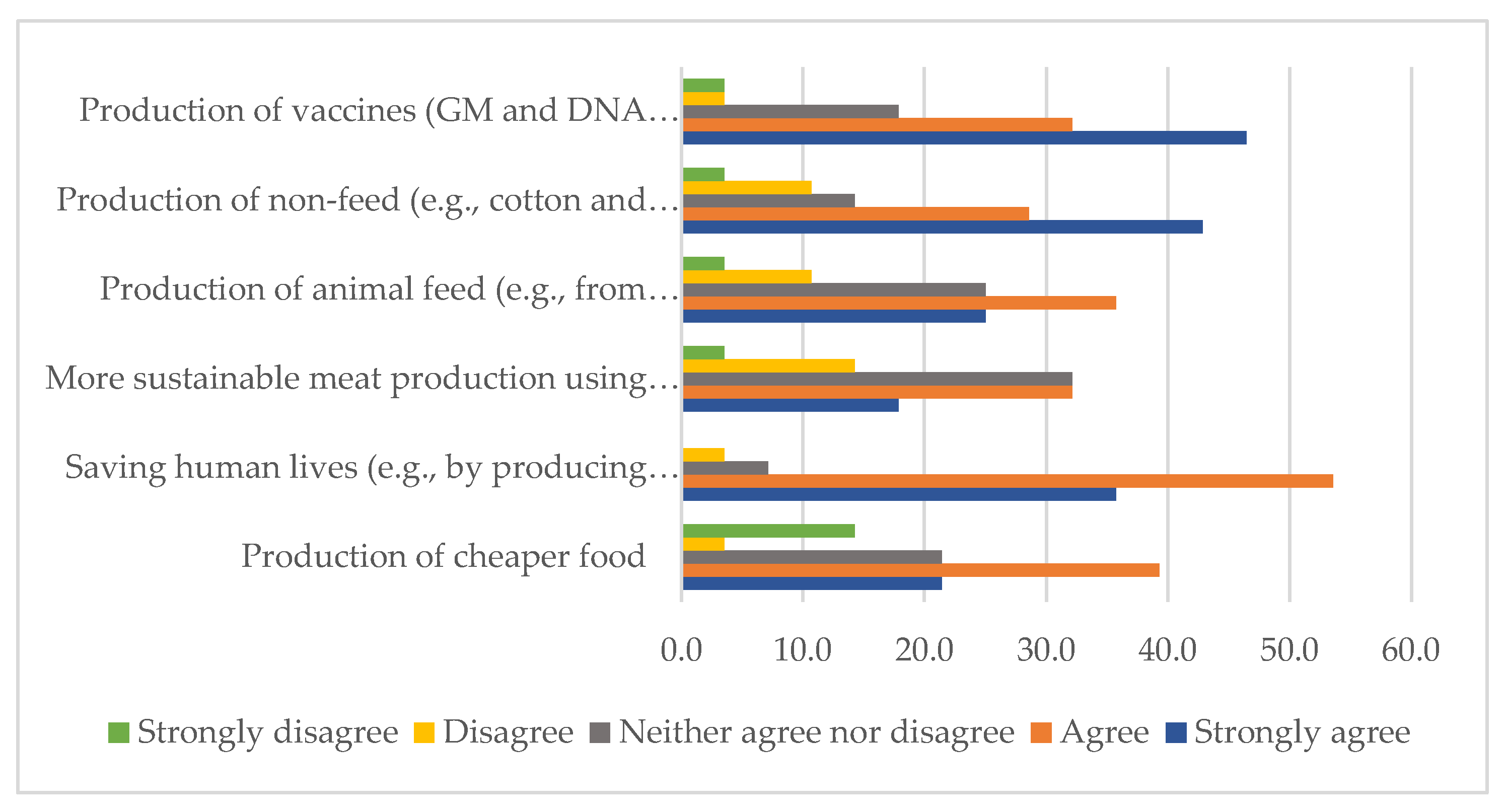
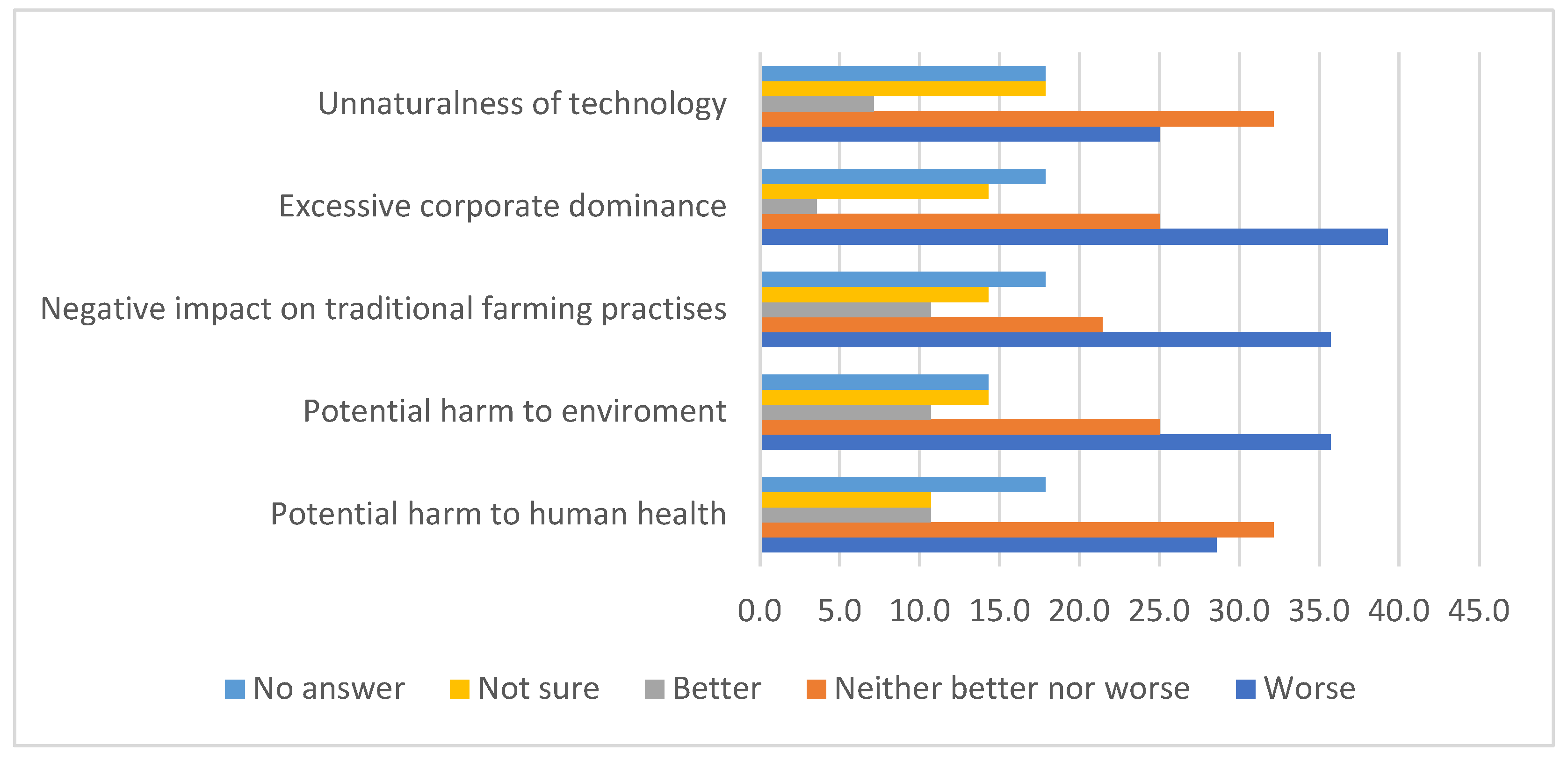
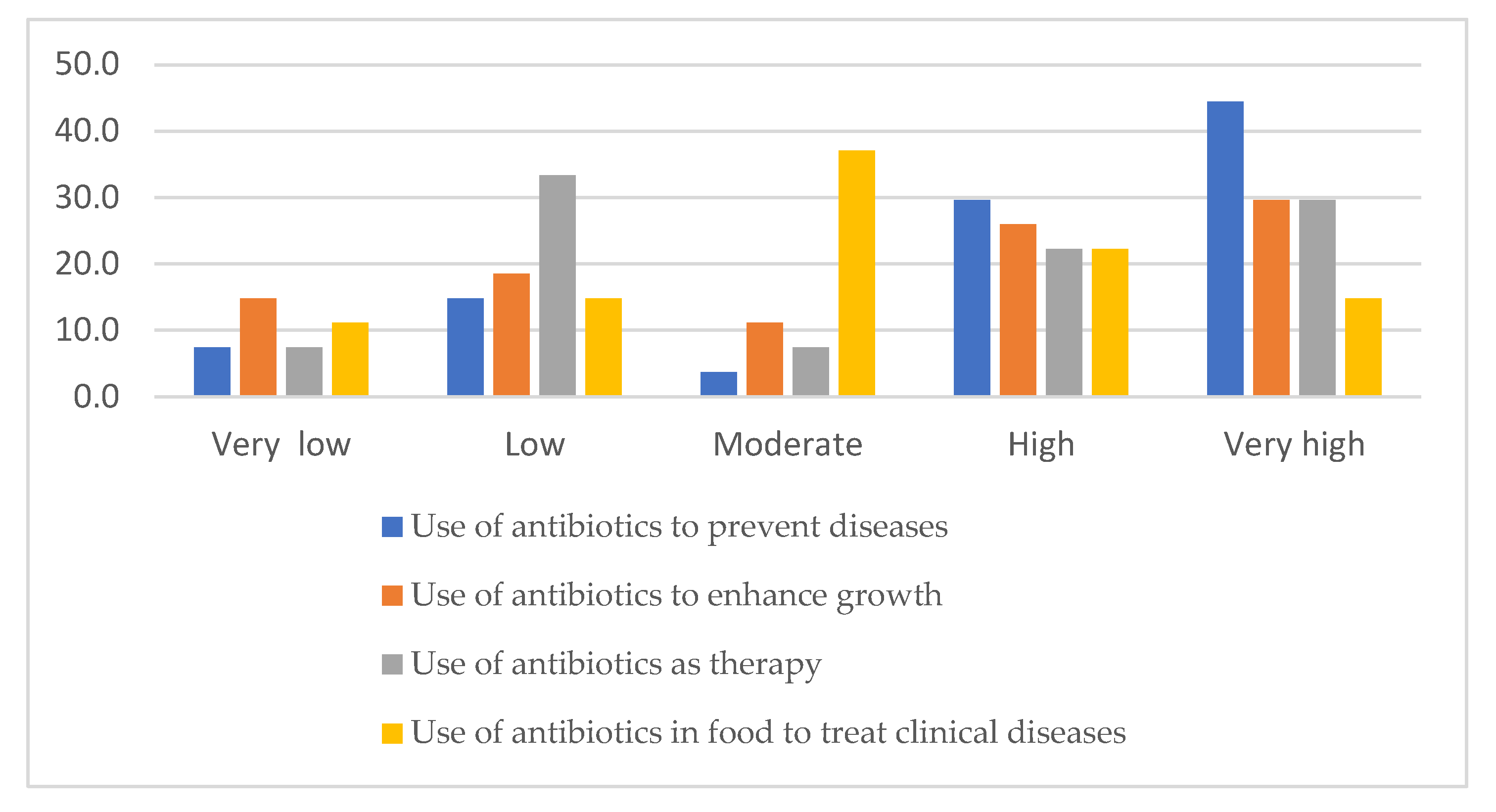
| Source of Information | Percent Cases GMO (%) |
Sectors for AMR (%) |
Percent (%) |
|---|---|---|---|
| School/college | 71.4 | Human Health | 11.1 |
| Media (newspaper, TV, radio) | 64.3 | Animal Health | 48.2 |
| Specific campaign | 35.7 | Plant Health | 14.8 |
| Family member or friend | 17.9 | Food Production | 22.2 |
| Extension worker | 17.9 | Food Safety | 29.6 |
| Others (workshops, projects) | 17.9 | ||
| Agrovet shop | 10.7 | ||
| Can’t remember | 3.6 |
| Safety of GMO | Frequency (percent %) | ||||
|---|---|---|---|---|---|
| Classification statements | Worse | Neither better nor worse | Better | Not sure | No Answer |
| Transfer of antibiotic resistance | 4 (14%) | 11 (39%) | 4 (14 %) | 6 (22%) | 3 (11%) |
| Transfer of toxicity | 4 (14%) | 12 (43%) | 2 (7%) | 2 (25%) | 3 (11%) |
| Transfer of allergenicity | 7 (25%) | 10 (36%) | 2 (7%) | 6 (21%) | 3 (11%) |
| Can cause cancer | 6 (21%) | 10 (36%) | 2 (7%) | 6 (21%) | 4 (15%) |
| Immune suppression | 4 (14%) | 1 (43%) | 3 (7%) | 6 (21%) | 4 (14%) |
| Loss of nutrition | 4 (14%) | 9 (32%) | 5 (19%) | 6 (21%) | 4 (14%) |
| Ethical arguments on GMO | Frequency and percent (%) | ||||
|---|---|---|---|---|---|
| Classification statements | Strongly Agree | Agree | Neither agree Nor disagree | Disagree | Strongly disagree |
| GM technology is against my belief/religion. | 2 (7%) | 2 (7%) | 10 (36%) | 7 (25%) | 7 (25%) |
| By using GM technology, we are “playing God”. | 4 (14%) | 2 (7%) | 8 (29%) | 6 (21%) | 8 (29%) |
| GM technology is not acceptable in animal production due to animal welfare concerns. | 2 (7%) | 5 (18%) | 9 (32%) | 4 (14%) | 8 (29%) |
| GM technology is not ethically acceptable in food production. | 1 (4%) | 6 (21%) | 6 (21%) | 8 (29%) | 7 (25%) |
| GM technology is not an ethically acceptable method for producing animal feed. | 1 (3%) | 7 (25%) | 7 (25%) | 5 (18%) | 8 (29%) |
| GM technology is not an ethically acceptable method for medicine production. | 0 (0%) | 3 (11%) | 6 (21%) | 7 (25%) | 12 (43%) |
| Using GM technology is "tampering" with nature i.e., “unnaturalness”. | 5 (18%) | 6 (21%) | 6 (21%) | 5(19%) | 6 (21%) |
| GM technology is unnatural, and hence not acceptable. | 4 (14 %) | 2 (7%) | 8 (29%) | 7 (25%) | 7 (25%) |
| Statement on support for GMOs | Strongly agree | Agree | Neither agree nor disagree | Disagree | Strongly disagree |
|---|---|---|---|---|---|
| Production of cheaper food. | 6 (21%) | 11 (39%) | 6 (21%) | 1 (5%) | 4 (14%) |
| Saving human lives (e.g., by producing medicines and vaccines). | 10 (36%) | 15 (53%) | 2 (7%) | 1 (4%) | 0 (0%) |
| More sustainable meat production using farmed animals (e.g., more efficient production and less animal disease). | 5 (18%) | 9 (32%) | 9 (32%) | 4 (14%) | 1 (4%) |
| Production of animal feed (e.g., from plants, algae and microorganisms) | 7 (25%) | 10 (36%) | 7 (25%) | 3 (10%) | 1 (4%) |
| Production of non-feed (e.g., cotton and fabrics, cosmetics). | 12 (43%) | 8 (29%) | 4 (14%) | 3 (10%) | 1 (4%) |
| Production of vaccines (GM and DNA vaccine) to prevent disease. | 13 (46%) | 9 (32%) | 5 (18%) | 0 (0%) | 1 (4%) |
| Awareness and understanding of Antibiotic resistance risks | Percent (%) |
|---|---|
| No significant awareness-raising activities on antibiotic resistance. | 11.1 |
| Some activities in parts of the country to raise awareness about risks of antibiotic resistance and actions that can be taken to address it | 25.9 |
| Limited or small-scale antibiotic resistance awareness campaign targeting some, but not all, relevant stakeholders (e.g., general public, pharmacists, nurses, medicine sellers) | 55.6 |
| Nationwide, government-supported antibiotic awareness campaign targeting all or the majority of stakeholders | 7.4 |
Disclaimer/Publisher’s Note: The statements, opinions and data contained in all publications are solely those of the individual author(s) and contributor(s) and not of MDPI and/or the editor(s). MDPI and/or the editor(s) disclaim responsibility for any injury to people or property resulting from any ideas, methods, instructions or products referred to in the content. |
© 2023 by the authors. Licensee MDPI, Basel, Switzerland. This article is an open access article distributed under the terms and conditions of the Creative Commons Attribution (CC BY) license (http://creativecommons.org/licenses/by/4.0/).





